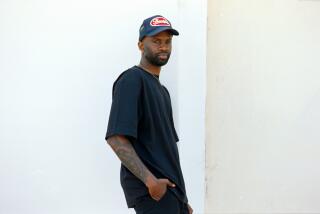How Fathers Figure
- Share via
DURING THE past 25 years, there has been a torrent of research about mothers and daughters, but until recently, says USC sociologist Thomas Lasswell, “no one was terribly interested in the relationship between fathers and sons.”
It’s a situation that is changing rapidly.
As researchers have become more aware of the father’s influence on his son’s emotional, intellectual and social development, says Ken Druck, a Del Mar author and clinical psychologist who runs workshops about the father-son relationship, “our understanding of the entire structure of the family has changed.”
Boys with strong, warm, nurturing fathers, it now appears, are more socially competent, more persistent at solving problems and more self-directed, says Norma Radin, a professor at the School of Social Work at the University of Michigan in Ann Arbor, writing in “Social Work in Education.” The effect is visible from infancy onward. Psychologists at the National Institutes of Mental Health found that boys as young as 5 months who had more contact with their fathers were friendlier with adult strangers than were those who had less. The infants with more contact vocalized more, showed a greater willingness to be picked up and enjoyed play more. Boys who lived with their fathers after divorce, report Dallas psychologists John W. Santrock and R. A. Warshak, were warmer, had a higher degree of self-esteem and were more mature and independent than boys who lived with their mothers.
On the other hand, when the father isn’t present either physically or emotionally, boys tend to be more aggressive and less compliant, Radin says. They have greater problems in preschool. They don’t obey their mothers as well. They have problems in peer relationships, tending either to play alone or to play with younger children.
Recent research, Radin says, also has established that the bond between fathers and sons is stronger than the bond between fathers and daughters. “Fathers relive their own experience of growing up through their sons,” says James A. Levine, director of the Fatherhood Project at Manhattan’s Bank Street School, while the tendency is much weaker among mothers and daughters.
Sons, in turn, tend to identify with the behavior of their fathers and to imitate it, particularly between the ages of 4 and 9. The more contact boys have with their fathers, the more their intellectual development flourishes, too. This has been documented for boys as young as 5 months, for 4-year-olds and for boys in the third grade.
Fathers, it turns out, relate to their sons differently from the way they do to their daughters. Fathers tend to touch newborn sons more often than they touch their daughters, Radin says. A study of year-old children found that fathers played half an hour longer per day with firstborn sons than firstborn daughters.
“Fathers are not mere substitutes for mothers,” Radin says. “The father’s physical, robust approach to the child complements and contrasts with the mother’s more verbal, slow-paced style.” And children of both sexes respond enthusiastically to their fathers’ playfulness, says Harvard pediatrician T. Berry Brazelton. “An infant by 2 or 3 weeks of age displays . . . a more wide-eyed, playful and bright-faced attitude toward his father than to his mother.”
Sociologists who have studied the interaction of children with fathers and mothers on playgrounds have concluded that, in general, fathers allow their children to roam farther afield, climb higher and take more chances, says Asa Baber, a Chicago author who writes a column on men’s issues for Playboy.
“Moms are wonderful, and they provide a safe, secure role model,” says Rick Porter, executive director of the Rainbow River child-care centers in Manhattan Beach, “but they (boys) need someone who is going to encourage them to take risks.” Finally, according to studies by psychologists including Henry B. Biller at the University of Rhode Island and Lloyd J. Borstelmann at Duke University, it is the father who is the primary influence regarding sex roles for both boys and girls. Fathers who are powerful, nurturing and available are most often seen as models by their sons. Weak fathers tend not to be imitated.
“I see many men walking around in mid-life with a sense of yearning for things that they can’t get from their wives and can’t get from their jobs and can’t pull from inside themselves,” Druck says. “Having listened to thousands of stories in workshops around the world, I’m convinced what the men are missing is sense of their own identity: a very primitive and very deep sense of validation that passes from father to son.”
“It’s the basic plea of the male child,” Baber says. “ ‘Dad, show me how to be a man.”’
More to Read
Sign up for Essential California
The most important California stories and recommendations in your inbox every morning.
You may occasionally receive promotional content from the Los Angeles Times.













